#mr bennet
Explore tagged Tumblr posts
Text
If I was mrs bennet I’d also loose my fucking shit because why am I the only one worried about destitution AND you’re all treating me like I’m crazy and hysterical for it
#something something doesn’t save her from her mothers fate#the older I get the more I get her#mr bennet is kind of terrible#I love him#but you couldn’t pay me to marry that man#p&p#p&p 2005#p&p 1995#pride and prejudice#pride and predjudice 2005#pride and predjudice 1995#elizabeth bennet#mrs bennet#mr bennet#jane bennet#lydia bennet#kitty bennet#mary bennet#jane austen
1K notes
·
View notes
Text
Mr. Bennet: Sure, I haven't taken care of my daughters' financial security, but have I at least taken care of their education? No. But have I taken care of their emotional needs? Also no. But have I been a good protector and supervisor? I'm afraid not. However, have I been a good example for my children of being a kind and respectful spouse, parent, and all around human being? No again. But through it all, have I nailed being funny? Yes. And isn't that the most important role of a father after all?
#pride and prejudice crack#pride and prejudice#jane austen crack#jane austen#mr bennet#my stuff#1k#2k#3k#4k#5k#6k#7k#8k#9k#10k#15k
16K notes
·
View notes
Text
The more I watch Pride and Prejudice (1995) the more Mr Collins' proposal scene creeps me out. Not for the proposal per se but for how he insists and sistemically writes off Elizabeth's refusal as a silly custom. And their society totally validates him while she would be only seen as stupid and a vain egoist. Her father is her only escape, but maybe it's just out of spite agains Mrs Bennet and disdain for Collins, rather than finding Lizzie upset.
And it's not like she doesn't care nor know about the implications of refusing such marriage. Mrs Bennet is upset because she saw losing her daughters' most safe way for economical survival fade away and you get how she might deem Lizzie as an egoistical rebel, but the system is the actual problem.
That stupid, delusional idiot thinks she's bothered enough to torment him before an acceptance.
9 notes
·
View notes
Text
I think the saddest thing about Pride and Prejudice adaptations is we never get to see Darcy talking to Mr. Bennet. Like I choose to believe with complete sincerity that Darcy just walked into that room, continuing the Colin Firth no smile, and was like "Mr. Bennet"
and Mr. Bennet was maybe like "Mr. Darcy? I don't believe we've had much opportunity to meet" before Darcy just immediately word vomits into basically repeating his first proposal to Elizabeth as he explains how bad an idea he knows it is, but how ardently he's in love with her and has asked for her hand in marriage and she has tentatively accepted his offer if Bennet would only give his blessing
23 notes
·
View notes
Text
Two statements about characters can and should co-exist: Pride and Prejudice edition
Mr Bennet has a close relationship with Elizabeth and provides amusing observations on the folly of human nature BUT he is a terrible husband and father who consistently neglects the women who rely on him for absolutely everything; Elizabeth and Jane turned out so well in spite of him, not because of him.
Mrs Bennet's behaviour is understandable given the era in which she lived and the subsequent pressure she was under to get her daughters married well, which wasn't entirely for vanity reasons given that Longbourn was entailed BUT she was still fundamentally vain, ridiculous and rude; such pressure, even combined with an absent husband, still does not make her behaviour justifiable, nor her a sympathetic character, as she enabled Lydia (whose subsequent elopement with Wickham almost ruined the family) for far too long.
Mr Collins is unfairly portrayed as a middle-aged sycophant in most adaptations, rather than the young clergyman who sucks up to his patroness in pursuit of a more lucrative living that he was BUT he is still a ridiculous character who you are not meant to feel sympathy for when Elizabeth rejects him; he is rude, hypocritical and thinks of himself far too highly considering how vapid he actually is.
Caroline Bingley is often too harshly judged as a 'pick-me,' even though her relentless pursuit of Darcy is understandable given his wealth & status and how important it was for women to make a good marriage BUT she was still rude, vain and treated Jane terribly; plus she was a hypocritical snob, given the manner in which she looked down upon the Bennet family's relations despite the Bingleys' own background in trade.
Elizabeth is incredibly witty, courageous and endearing and instantly likeable which makes Darcy's slight of her at the Meryton assembly all the more of an affront to us as readers BUT, while it explains her dislike of him, she is no means perfect herself; she had far too much misplaced pride in her ability to successfully read others' characters and consequently ignored positive accounts of Darcy in favour of believing the deceitful Wickham, given her prejudice against the former.
Mr Darcy was harshly judged by Elizabeth, even though there are many more sympathetic elements to his character than immediately meet the eye BUT he was not shy or innocent; he was always a haughty rich man who had never been told no, thought far too highly of himself and, ultimately, thoroughly deserved to be rebuked and subsequently made to reform his character.
#pride and prejudice#jane austen#mr bennet#mrs bennet#mr collins#caroline bingley#elizabeth bennet#mr darcy#fitzwilliam darcy#classic lit#text#my analysis#all these characters have so much nuance to them#it's why i adore the book and care so passionately about them NOT being flattened#like all humans they are flawed and jane austen very much meant for us to know that!!!!#i was trying very hard to say something nice about mr bennet#great gowns beautiful gowns#i truuuuly loathe him but don't confuse hating mr bennet for redeeming mrs bennet#elizabeth can't even fault darcy on that like his approach was wrong but. he had a POINT#anyway thanks for coming to my ted talk this is very important to meeeeee#1k
2K notes
·
View notes
Text
youtube
Parenting according to Mrs Bennet - Pride and Prejudice (1995)
“If I wished to think slightingly of anybody’s children, it should not be of my own” – Pride and Prejudice, Ch. VII
#pride and prejudice#pride and prejudice 1995#jane austen#p&p#p&p 1995#period drama#mrs bennet#jane bennet#elizabeth bennet#mary bennet#kitty bennet#lydia bennet#mr bennet#mr bingley#mr darcy#jennifer ehle#colin firth#perioddramaedit#p&pedit#janeaustenedit
9 notes
·
View notes
Text
I'm drafting a long semi-headcanon post as I try to phrase it properly, but I'm tired right now so I'll just leave you with the conclusion:
Mr Bennet has made Elizabeth into the closest feasible approximation of the son he wanted and never had, and relates to her through that framework as much as possible. Meanwhile, Lady Catherine can't quite acknowledge that her literal daughter is a disappointment to her, and instead just openly fantasizes about a totally unrecognizable version of Anne that has never existed. Her real spiritual daughter is Darcy.
#further conclusion: gender essentialist readings of elizabeth and darcy are the WORST#anghraine babbles#anghraine's headcanons#austen blogging#mr bennet#elizabeth bennet#lady catherine de bourgh#fitzwilliam darcy#otp of otps
1K notes
·
View notes
Text
Sometimes I think about the fact that at some point someone, probably Mr Bennet, said something along the lines of "you know Mr Darcy I was kind of surprised Lizzy accepted your proposal" and Mr Darcy just goes "oh yeah so was I especially after she rejected me the first time" and Mrs Bennet absolutely looses her marbles ("I will never talk to you again" "But Mama, I'm literally married to him!")
52 notes
·
View notes
Text

169 notes
·
View notes
Text

506 notes
·
View notes
Text
Starting a reread of Pride and Prejudice and keeping an eye out for some things that have been mentioned by the Austen fandom:
1) The Bennets do not seem so notably wealthy – by gentry standards – as has been suggested by parts of the fandom, nor does Mr. Bennet in particular seem so blameable in not having saved a more substantial inheritance for his daughters.
The Bennets have two thousand a year for 7 people. This is, IIRC, a little over twice per person what the Dashwoods have in Sense & Sensibility (500 pounds a year for four people), and the Dashwoods are very much at the low end of the gentry. It’s about half what is considered a notably rich member of the gentry in this book or others (five thousand a year, like Mr. Bingley has, or four thousand a year which is, I think, what Henry Crawford has).
Also, it seems like Mr. Bennet is impeded in his management of the estate by Mrs. Bennet, from this line from Mr. Bennet (when Mrs. Bennet is urging him to use the pretext of the horses being needed for the farm to not send Jane to Netherfield in the carriage, so she will be obliged to stay overnight if it rains): “They [the horses] are wanted in the farm much oftener than I can get them.” Combined with the early narratorial statement that the solace of Mrs. Bennet’s life is “visiting and news”, this suggests conflicts between her using the horses for visiting purposes and the needs of the horses for the farm. (Though I wouldn’t have expected carriage-horses to overlap with farm work much.)
Mr. Bennet feels less like someone who is by inclination negligent, and more like someone who has, over 20+ years, grown tired of re-fighting the same battles over and over with his wife (who is incapable of absorbing any idea that is counter to her own inclinations), and largely given up. He baits his wife, but he does do some necessary things promptly: after insisting to his wife that he will not visit Mr. Bingley, he is in fact “among the earliest” to do so.
I see Mr. Bennet not as an unsympathetic character, but as the “failure state” of both Elizabeth and, in a lesser way, Darcy: this is who you become if you have no one close to you whom you respect as a peer. (Darcy wouldn’t be as openly mocking, but his interactions with Miss Bingley when Elizabeth is at Netherfield – brief and curt – give a flavour of what he’s like around someone he’s close to who is bothering him.) Elizabeth likes her father; he visits her regularly after her marriage and there’s no indication either her or Darcy mind; but his life isn’t the future we want for Elizabeth. Nor is it the future he wants for Elizabeth, as we see with his response to both Mr. Collins’ proposal and Elizabeth’s telling him of her engagement to Darcy.
2) I’m noticing the connections between Elizabeth’s and Darcy’s early conversations more this time. For example, on one evening at Netherfield they debate whether a plable temper (Bingley’s) isca good bad thing, with Elizabeth saying that being easily convinced by your friends of matters of no great import, based on your affection for them, is amiable. In a later conversation at Netherfield, Darcy says (in comment on his non-mockable faults): “My temper I dare not vouch for. – It is I believe too little yielding – certainly too little for the convenience of the world…My feelings are not puffed about with every attempt to move them.” This feels like a response to what Elizabeth was saying earlier, meaning their conversation (in contrast to Miss Bingley’s mix of flattering him and twitting him about Elizabeth, it is one where he’s being argued with; he seems to prefer that) has stuck in his head.
On a funnier note, the earlier conversation had Darcy condemning humblebrags (“Nothing is more deceitful than the appearance of humility. It is often only carelessness of opinion, and sometimes an indirect boast”), but I suspect that he’s engaging in it here, and actually prides himself on his resoluteness.
3) While Miss Bingley isn’t a villainness, she’s certainly an unpleasant person. She’s mean, she’s two-faced (mocking her “friend’s” relatives behind her back while her “friend” is sick, though being usually kind and courteous to her face), and she doesn’t have enough sense or perception to pick up on when her flattery towards Darcy and her insults towards Elizabeth are annoying Darcy.
4) Elizabeth gives very little indication of being a bookworm (nor a tomboy), in contrast to some characterizations. Even in the scene where her reading is mentioned, she is in fact largely ignoring the book in favour of paying attention to the conversation at the card table; she picked up the book more out of prudence (the card game is gambling and she guesses they are betting too much for her means) than intrinsic interest. In two other scenes at Netherfield – during the few times she is not tending to Jane – she is doing needlework. Her muddy walk to Netherfield is inspired by affection for Jane and desire not to use the carriage needlessly, not by a love of muddy walks.
5) Despite some posts I’ve seen on use of Lizzy vs Eliza as nicknames for Elizabeth Bennet (Lizzie is more common), both Charlotte Lucas and Miss Bingley do refer to her as Eliza at some points.
338 notes
·
View notes
Text


when i heard this quote i immediately thought of them. specifically the 1995 version.
#pride and prejudice#elizabeth bennet#lizzie bennet#mr bennet#pride and prejudice 1995#mrs bennet is just doing what she was taught to do#mr bennet is lazy and didnt plan their futures well and i think we should laugh at HIM instead
44 notes
·
View notes
Text
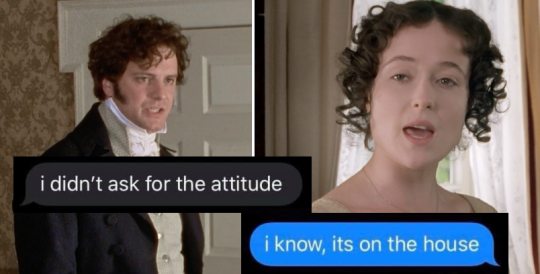
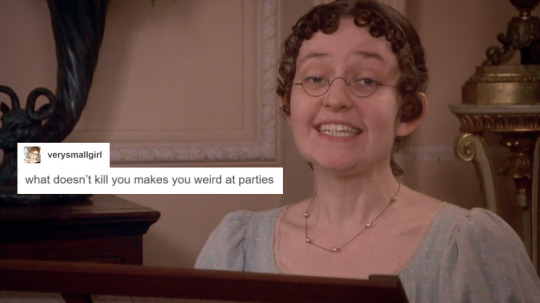
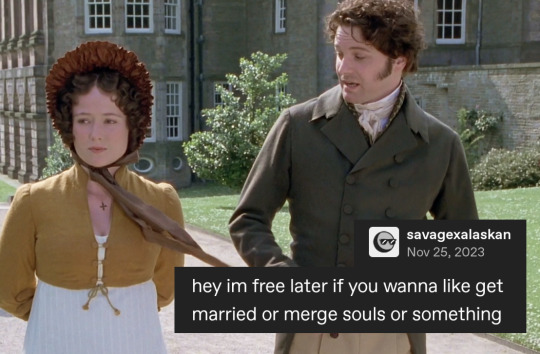


Pride and Prejudice 1995 text posts, part 6 of ? - prev set, next set
More: Persuasion 1995 text posts | Sense and Sensibility 1995 text posts | Northanger Abbey 2007 text posts | Emma. 2020 text posts
#pride and prejudice memes#pride and prejudice#jane austen memes#jane austen#english lit memes#text posts#pnp text posts#pride and prejudice 1995#mr darcy#elizabeth bennet#mary bennet#mr bennet#mr wickham#georgiana darcy#my stuff#1k#2k#3k#4k
4K notes
·
View notes
Text





Kiera Knightley & Donald Sutherland as Elizabeth Bennet & Mr. Bennet
Pride & Prejudice (2005)
#perioddramaedit#perioddramasource#filmedit#moviegifs#periodedit#perioddramasonly#perioddramacentral#adaptationsdaily#pride and predjudice 2005#pride and prejudice#pride & prejudice#elizabeth bennet#mr bennet#lizzie bennet#kiera knightley#kknightleyedit#donald sutherland#ripley's gifs
296 notes
·
View notes
Text
"My child, let me not have the grief of seeing you unable to respect your partner in life."
- Mr Bennet to Elizabeth Bennet, clearly thinking of his own unsatisfactory marriage; his most poignant words in the novel and one of the only times he takes any situation seriously.
9 notes
·
View notes
Text
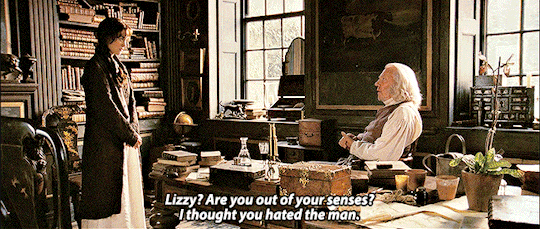

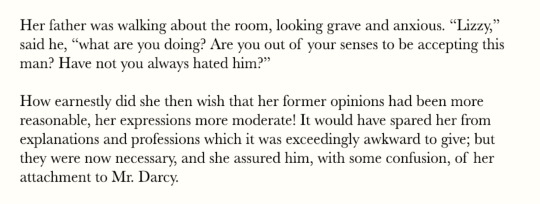


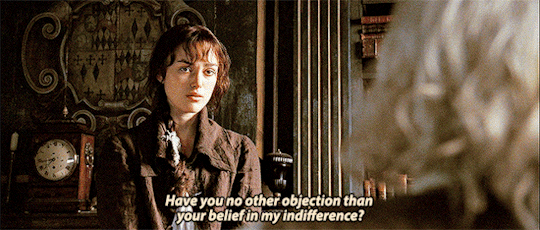

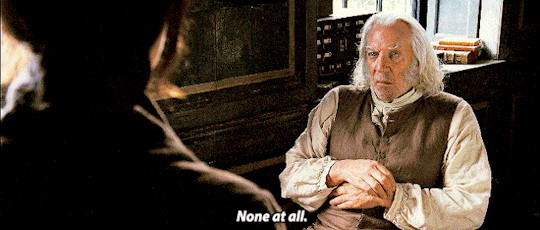
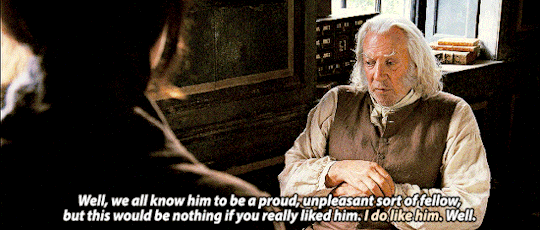





pride & prejudice: from book to movie pt. 2
pt 1
#pride and prejudice#p&p#p&p 2005#pride and prejudice 2005#pride and prejudice book#jane austen#austenedit#perioddramaedit#perioddramasource#book to screen#dialogue comparison#adaptation#keira knightley#elizabeth bennet#mr bennet#donald sutherland#anna attempts photoshop#1k+#1k
2K notes
·
View notes